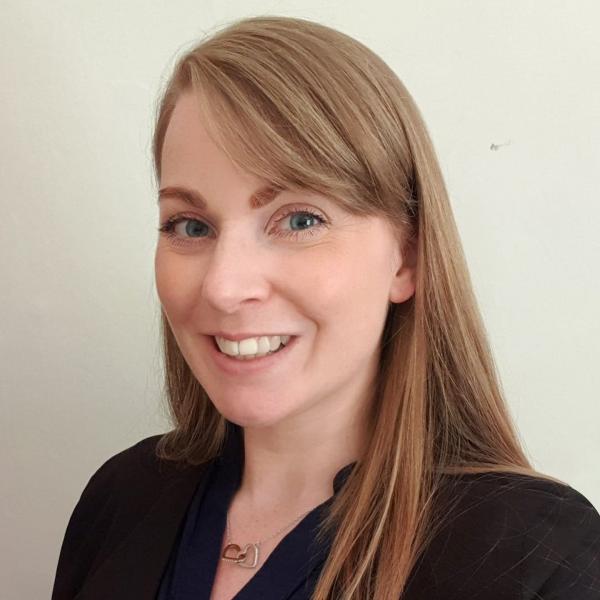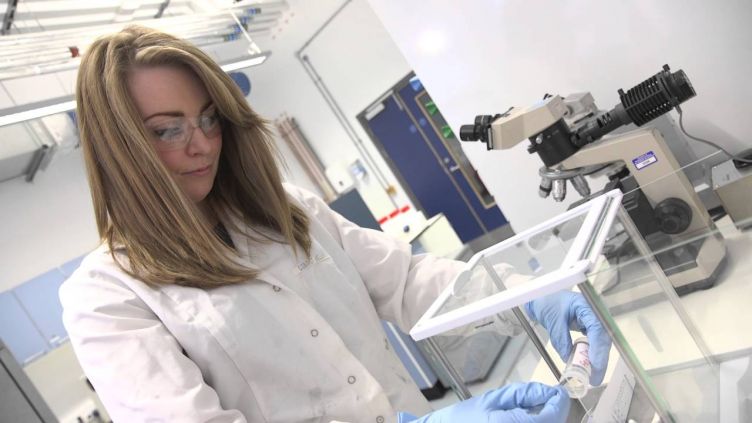Dr Amy Gandy
MPhys (Hons), PhD
School of Chemical, Materials and Biological Engineering
Visiting Professor


Full contact details
School of Chemical, Materials and Biological Engineering
Sir Robert Hadfield Building
Mappin Street
Sheffield
S1 3JD
- Profile
-
Amy joined the Department of Materials Science and Engineering in 2011 to investigate the effect of radiation damage on the atomic and nano-structure of model nuclear waste glasses. Her current research focuses on radiation-induced damage and recovery mechanisms, and gas bubble formation, in poly-crystalline oxide-based materials and advanced multicomponent alloys for nuclear fission and fusion.
Prior to this, Amy undertook a postdoctoral research position at the University of Manchester (2009-2011), having completed a joint PhD at the University of Salford and the University of Poitiers, France, in 2009 for which she used transmission electron microscopy (TEM) to understand ion beam implantation induced defect formation and interactions during thermal annealing in crystalline and amorphous silicon, relevant to the semiconductor industry.
- Qualifications
-
- 2020 - current: Senior Lecturer in Nuclear Materials Engineering, Department of Materials Science and Engineering, University of Sheffield
- 2015 - 2019: Lecturer in Nuclear Engineering, Department of Materials Science and Engineering, University of Sheffield
- 2011 - 2015: Research Associate, Department of Materials Science and Engineering, University of Sheffield
- 2009 - 2011: Research Associate, University of Manchester
- 2006 - 2009: PhD, University of Salford and University of Poitiers, France
- 1999 - 2003: MPhys Physics and Space Technology, University of Salford
- Research interests
-
Amy's primary research is to develop materials for extreme environments, with interests in understanding radiation damage effects in solids, particularly in alloys and ceramics, and nuclear materials development. Amy's current PhD studentships are co-funded with the Culham Centre for Fusion Energy (CCFE) and National Nuclear Laboratory (NNL), and collaborative projects are funded by the United Kingdom Atomic Energy Authority (UKAEA) and EPSRC. Amy’s research centres on understanding radiation-induced defect formation, accumulation, and thermal recovery, and the development of new materials for the next generation of nuclear technologies (fission and fusion). Her group uses electron microscopy, including ion irradiation and thermal annealing in-situ in a TEM, and X-ray diffraction and spectroscopic methods, to characterise the structure of materials and ion beam induced defect morphologies.
Amy's interdisciplinary research is based across the NucleUS Immobilisation Science Laboratory (ISL), the Metallurgy, and Functional Materials and Devices groups. This cross-group membership drives development of Li-ceramics and reduced activation compositionally complex alloys (including the so-called high entropy alloys) for nuclear fusion, and the investigation of helium gas bubble formation and ion beam irradiation-induced defect formation and recovery mechanisms in materials for a range of applications.
Current projects:
- Royal Academy of Engineering / Leverhulme Trust Research Fellowship in Understanding Radiation Damage Mechanisms in Novel, Compositionally Complex Alloys (1 Sept 2021 – 31 August 2022).
Work Group Leader, Horizon 2020 funded COST Action Network (CA19140): Focused Ion Technology for Nanomaterials (FIT4NANO) - Development of Radiation Damage Resistant High Entropy Alloys for Advanced Nuclear Systems (EPSRC, EP/R021864/1)
Previous projects:
- Indo-UK Civil Nuclear Network (EPSRC, EP/M018296/1)
- Co-I on the Leverhulme Trust funded “PicoFIB Network”
- Royal Academy of Engineering / Leverhulme Trust Research Fellowship in Understanding Radiation Damage Mechanisms in Novel, Compositionally Complex Alloys (1 Sept 2021 – 31 August 2022).
- Publications
-
Journal articles
- Using concentration gradients to examine the effects of Al, Ga and Sn additions on the low-activation VCrMnFe system. Journal of Physics: Energy, 5(2), 024013-024013.


- Design principles of low-activation high entropy alloys. Journal of Alloys and Compounds, 907.


- An assessment of the high-entropy alloy system VCrMnFeAlx. Journal of Alloys and Compounds, 161525-161525.


- Novel reduced-activation TiVCrFe based high entropy alloys. Journal of Alloys and Compounds, 856.


- High-entropy alloys for advanced nuclear applications. Entropy, 23(1).


- Phase Distribution, Composition, and Disorder in Y2(Hf,Sn)2O7 Ceramics: Insights from Solid-State NMR Spectroscopy and First-Principles Calculations. The Journal of Physical Chemistry C, 124(31), 17073-17084.


- Radiation damage tolerance of a novel metastable refractory high entropy alloy V2.5Cr1.2WMoCo0.04. Journal of Nuclear Materials, 531. View this article in WRRO


- Finite element modeling of resistive surface layers by micro‐contact impedance spectroscopy. Journal of the American Ceramic Society, 103(4), 2702-2714. View this article in WRRO


- Resistance to amorphisation in Ca1-xLa2x/3TiO3 perovskites – a bulk ion-irradiation study. Acta Materialia, 180, 180-188. View this article in WRRO


- High temperature and ion implantation-induced phase transformations in novel reduced activation Si-Fe-V-Cr (-Mo) high entropy alloys. Frontiers in Materials, 6. View this article in WRRO


- Modeling the Influence of Two Terminal Electrode Contact Geometry and Sample Dimensions in Electro-materials. Journal of the American Ceramic Society. View this article in WRRO


- Transformation of Cs-IONSIV® into a ceramic wasteform by hot isostatic pressing. Journal of Nuclear Materials, 498, 33-43.


- Iron phosphate glasses: Bulk properties and atomic scale structure. Journal of Nuclear Materials, 494, 342-353. View this article in WRRO


- Formation of F6V2 complexes in F-implanted Ge determined by x-ray absorption near edge structure spectroscopy. Materials Science in Semiconductor Processing.


- Simulation of alpha decay of actinides in iron phosphate glasses by ion irradiation. Nuclear Instruments and Methods in Physics Research Section B: Beam Interactions with Materials and Atoms, 371, 424-428.


- The durability of iodide sodalite. Journal of Nuclear Materials, 449(1-3), 168-172.


- Surface sensitive spectroscopy study of ion beam irradiation induced structural modifications in borosilicate glasses. Materials Research Society Symposium Proceedings, 1514, 75-80.


- The Effect of γ-radiation on Mechanical Properties of Model UK Nuclear Waste Glasses. MRS Proceedings, 1518, 41-46.


- Thermal Conversion of Cs-exchanged IONSIV IE-911 into a Novel Caesium Ceramic Wasteform by Hot Isostatic Pressing. MRS Proceedings, 1518, 67-72.


- The effect of uranium oxide additions on the structure of alkali borosilicate glasses. Journal of Non-Crystalline Solids, 378, 282-289.


- Advanced ceramic wasteforms for the immobilisation of radwastes. Ceramic Transactions, 241, 11-22.


- Positron annihilation studies of fluorine-vacancy complexes in Si and SiGe. Journal of Applied Physics, 111(7), 073510-073510.


- Crystal structure and non-stoichiometry of cerium brannerite: Ce 0.975Ti 2O 5.95. Journal of Solid State Chemistry.


- The effects of γ-radiation on model vitreous wasteforms intended for the disposal of intermediate and high level radioactive wastes in the United Kingdom. Journal of Nuclear Materials.


- Crystal structure and non-stoichiometry of cerium brannerite: Ce
0.975 Ti2 O5.95 . Journal of Solid State Chemistry, 192, 172-178.

- The effects of γ-radiation on model vitreous wasteforms intended for the disposal of intermediate and high level radioactive wastes in the United Kingdom. Journal of Nuclear Materials, 429(1-3), 353-367.


- Solid-phase epitaxial regrowth of amorphous silicon containing helium bubbles. Journal of Applied Physics, 104(9), 094905-094905.


- The interaction of cavities in silicon with moving amorphous–crystalline interfaces. Nuclear Instruments and Methods in Physics Research Section B: Beam Interactions with Materials and Atoms, 257(1-2), 177-180.


- The effect of ion-beam specimen preparation techniques on vacancy-type defects in silicon. Nuclear Instruments and Methods in Physics Research Section B: Beam Interactions with Materials and Atoms, 242(1-2), 610-613.


Conference proceedings
- Using concentration gradients to examine the effects of Al, Ga and Sn additions on the low-activation VCrMnFe system. Journal of Physics: Energy, 5(2), 024013-024013.
- Research group
-
Dr Hamed Shahmir, PDRA, working on the development of radiation damage resistant high entropy alloys for advanced nuclear systems (EPSRC)
Dhinisaben Patel, PhD student, working on high entropy alloys for fusion: Exploration of novel processing routes and HEA stability in extreme environments (Advanced Metallic Systems CDT and Culham Centre for Fusion Energy)
Samuel Waters, PhD student, working on ceramic breeder materials for fusion (EPSRC DTA and Culham Centre for Fusion Energy)Enrique Casanas Montesdeoca, PhD student, working on application of novel ceramic synthesis to the development of lithium-containing fuels for nuclear fusion (EPSRC DTA)Kavi Sharma, PhD student, working on enhancing understanding of the fundamental mechanisms which influence AGR cladding behaviour (Advanced Metallic Systems CDT and National Nuclear Laboratory)
- Professional activities and memberships
-
- Member of the Editorial Team for the UKAEA UK Fusion Materials Roadmap UK-Fusion-Materials-Roadmap-030921-Interactive.pdf (ukaea.uk)
- Member of the Analytical Electron Microscope with In Situ Capability for β, γ Active Materials (RadIAEM)
- Member of the Royal Society’s International Exchanges Committee (2019 - present)
- Guest Editor, Frontiers in Materials, Special Issue: Rising Star (2019 to 2021)
- Recipient of the "Rising Star" award by the journal Frontiers in Materials (2018)
- Member of the L'Oreal UNESCO Women in Science Fellowships Review Panel (2015 to present)
- Member of the EPSRC Fusion Advisory Board (2017 - present)
- Member of the IOM3 Women in Materials Committee (2016 - 2020)
- Deputy Chair of Women@TUoS (2017 - 2018)
- Women in Engineering
We interviewed Amy for the Faculty of Engineering's Wall of Women when she was a Lecturer in Nuclear Engineering. Here's Amy's interview:
The Wall of Women profiles were taken over a 4/5 year time period and are a snapshot of what our engineers were doing at that time.

